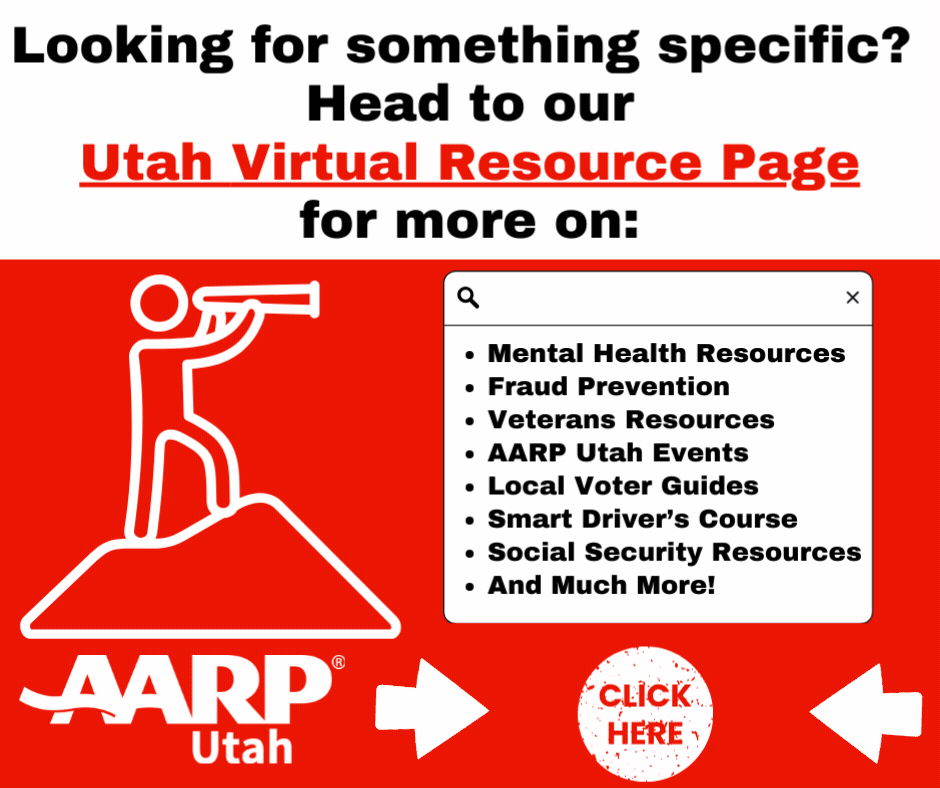AARP Hearing Center

Many Older Americans Face Mental Health Challenges
An AARP survey reveals while most older adults say their emotional and mental health is very good, many say they have been bothered by anxiety and depression -- these resources may help.
RESOURCES TO STAY CONNECTED:
- AARP Foundation Connect 2 Affect: Tools to help you or a loved one overcome social isolation
- Utah 211 connects you with community resources, services, and assistance.
- The AARP Utah Facebook Page helps you connect to others with shared interests and contains the latest updates and news.
- AARP Community Connections helps people stay in touch. By providing some contact information, people can receive a friendly check-in call from an AARP volunteer.
UTAH HELPLINES, RESOURCES AND CLINICS:
Help is within reach. If you or someone you know is unable to engage in normal daily activities and needs additional help, you have a number of additional possible resources available.
- Utah Crisis Line: 1-800-273-8255 offers 24/7 free and confidential crisis help and support
- The Utah Warm Line: 1-833-SPEAKUT (toll free) is available 8AM - 11PM, daily, 365 days a year
- Utah Department of Public Health & Human Services
- State Health and Insurance Assistance Program (SHIP): The State Health Insurance Assistance Programs (SHIPs) provide local, in-depth, and objective insurance counseling and assistance to Medicare-eligible individuals, their families, and caregivers. Call: 1-800-541-7735. Or find your nearest SHIP location in Utah
UTAH FOOD ASSISTANCE RESOURCES:
Because good nutrition is linked to mental wellness, it's important to maintain a healthy diet.
- Utah Food Bank: Offers statewide help to those who are food insecure.
- The Utah Department of Health and Human Services, Aging & Adult Services division has a comprehensive list of services for Utahns, including Nutrition Services.
- The State of Utah offers the Supplemental Nutrition Assistance Program (SNAP)
MORE RESOURCES FROM AARP
AARP HEALTH TOOLS
NATIONAL HELPLINES:
If you’re in need, several services are available 24/7, 365 days per year. Here are some examples:
- 988 Suicide and Crisis Lifeline: Anyone contemplating suicide or experiencing emotional distress may call, text or chat the 988 Suicide and Crisis Lifeline to speak with a trained counselor who can provide support and connect them to local resources if necessary. Like the 911 emergency service, the number is staffed 24/7 nationwide, with a network of over 200 state and local crisis call centers.
- Call 911 if you or someone you know is in immediate danger of hurting themselves or others.
- The Substance Abuse and Mental Health Services Administration (SAMHSA) is the agency within the U.S. Department of Health and Human Services that leads public health efforts to advance the behavioral health of the nation. SAMHSA’s National Helpline: Call 1-800-662-HELP (4357)
- A free and confidential treatment referral and information service (in English and Spanish) for individuals and families facing mental and/or substance use disorders.
- National Institute of Mental Health Crisis text hotline: Text “HELLO” to 741741
- This text line serves anyone, in any type of crisis, connecting them with a crisis counselor who can provide support and information.
- Veterans Crisis Line: Call 1-800-273-8255 and press ‘1’ or text 828255. Those with hearing loss can call 1-800-799-4889
- A free, confidential resource that connects veterans with a trained responder. The service is available to all veterans, even if they are not registered with the VA or enrolled in VA healthcare.
- Disaster Distress Helpline: Call 1-800-985-5990 or text “TalkWithUs” to 66746
- This free, confidential, and multilingual helpline provides immediate crisis counseling for people who are experiencing emotional distress related to any natural or human-caused disaster.
































































